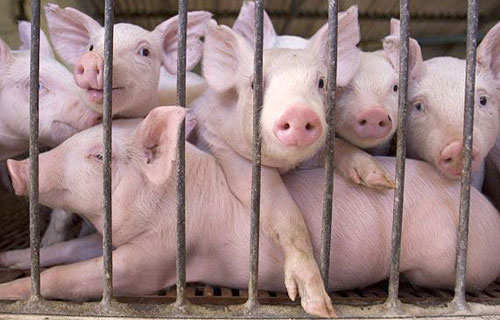
Most factory farms are controversial enough in the way that animals are handled there. Chickens and pigs are crowded into small areas, often for their entire lives, subjected to overfeeding, and denied fresh air and sunlight. But an analysis by the National Resources Defense Council concluded that factory farming also poisons the environment by feeding animal wastes into massive lagoons, which leak and overflow. Pollution regulations are non-existent, to boot.
The manure and urine of the animals are funneled into odorous cesspools of dangerous microbes and drug resistant bacteria, which often get into water supplies. These lagoons also release toxic gases, including hydrogen sulfide, methane, and ammonia. People who work at factory farms are at even greater risk of being exposed to all this than those who live near the lagoons. Often, they inhale chemicals from decomposing manure that can cause headaches, dizziness, shortness of breath, and diarrhea. The effects they have on the body can even result in comas or death.
Tyson Foods, the world’s largest meat producer, is perhaps the most notorious example of terrible factory farming conditions. The Arkansas-based corporation has been at the receiving end of many lawsuits, including a case in 2009 where they were found to be dumping hundreds of thousands of tons of bird waste onto sensitive farmland in Oklahoma. That waste subsequently got into rivers that were once pristine, filling them with arsenic, bacteria, and antibiotics.
That, however, seems to be the terrible price the environment pays for corporate agriculture, which Sierra Club conservation organizer Aloma Dew denounced as “threatening the way of life of our family farmers who believe in good-neighbor practices and care about the land and the law. Giant, corporate-owned factory farms are polluting our air and our water.”
Factory farms are also responsible for a loss of genetic diversity in animals due to selective breeding, unsustainable use of water and energy, and poor unsanitary conditions for their workers.
Virginia-based pork processor Smithfield Foods has been found guilty of all of these things at one point or another. According to Rolling Stone, 500,000 pigs at a typical Smithfield factory generate more waste per year than all of the human inhabitants of Manhattan. Given that fact, it’s particularly troubling that over a four-year period, Smithfield dumped 4.7 million gallons of hog manure into North Carolina’s lagoons – which leaked into the rivers. Predictably, Smithfield has treated its workers with as little care as its swine, and has come to blows with the United Food and Commercial Workers Union, which tried desperately to organize workers throughout the 90’s and did not succeed in doing so until 2008, after workers voted in favor of unionizing.
What one can glean from all this is that factory farms have become a destructive, pollutant corporate force in the U.S. But there are solutions to the problems they perpetuate.
The EPA can impose stricter regulations, including pushing for accountability, monitoring water quality, and making these companies pay for the cleanup and disposal of the wastes their animals create. Consumers can also push for improvements by refraining from purchasing meat from companies like Tyson or Smithfield Foods and looking instead for organic, free-range pork and poultry.
“We can’t let [these corporations] treat waterways around the country like their personal sewer,” said Environment Maryland’s Meg Cronin. “It’s time for the EPA to put tough limits on factory farm pollution.”
Photo: EcoWatch.org










